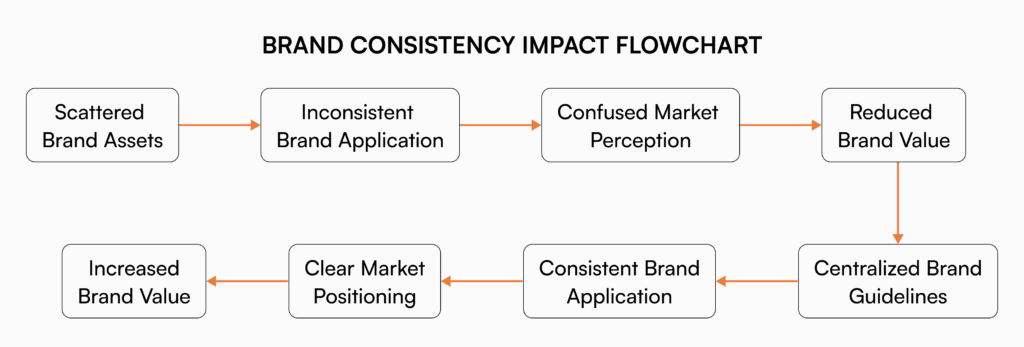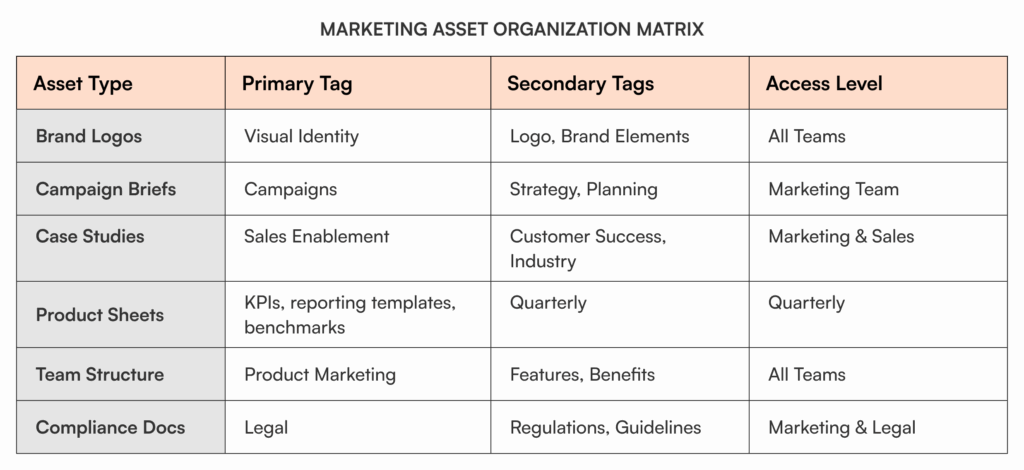Marketing leaders know the frustration: Your team produces brilliant work, but too much energy goes into finding assets, aligning on processes, and ensuring everyone follows the latest guidelines. When key information is scattered across shared drives, emails, and chat threads, your marketing effectiveness suffers.
Growing companies feel this pain acutely. The informal systems that worked when your marketing team was small become serious bottlenecks as you scale. The result? Inconsistent branding, duplicated efforts, and valuable institutional knowledge that disappears when team members transition.
An internal knowledge base provides a structured solution to these challenges. Let’s explore seven complex marketing tasks that become significantly easier when your team has a centralized, searchable hub for marketing knowledge.
Brand guidelines management
“Has anyone seen the latest logo file?” This question echoes through marketing departments everywhere, typically followed by frantic searching through folders or messaging colleagues for help.
When brand assets exist in multiple locations, inconsistency inevitably follows:
- Designers inadvertently use outdated logos in new materials.
- Content creators develop messaging that doesn’t align with current positioning.
- Regional teams interpret brand standards differently, creating market confusion.
A centralized knowledge base eliminates these problems by establishing a single source of truth. Your team can tag critical brand elements for easy retrieval, implement version control for marketing assets as guidelines evolve, and create clear ownership of brand documentation.

Campaign documentation and marketing asset library
Your marketing team runs a successful campaign. Everyone celebrates the result, then promptly moves on to the next project. Six months later, you’re planning a similar initiative, but the insights, assets, and learnings from that previous campaign are scattered across personal notes, analytics platforms, and project management tools.
A Content Marketing Institute survey revealed that 65% of the most successful content marketers have a documented content strategy compared to just 14% of the least successful. This difference highlights the value of systematic documentation.
A robust knowledge base transforms campaign management by:
- Creating standardized templates for documenting campaign strategy and results
- Preserving assets, messaging, and performance metrics in one searchable marketing resource library
- Connecting post-campaign analysis directly to campaign materials
- Making institutional memory accessible regardless of team turnover
When planning new campaigns, your team can quickly reference what worked (and what didn’t) in similar past efforts, building on previous successes rather than starting from scratch.
Marketing asset organization and searchable resources
Find yourself thinking: “I know we created something like this before”? Without organized marketing resources, your team faces common challenges:
- Spending more time searching for assets than actually using them
- Recreating materials that already exist but can’t be located
- Using outdated versions because the current ones are hard to find
- Struggling with inconsistent file naming and organization
Document your marketing resource management with a checklist approach:
- Establish consistent naming conventions for all marketing assets.
- Implement a tagging system that reflects how your team actually works.
- Create clear categories for different types of marketing materials.
- Set up regular audits to archive outdated materials.
- Document the organization system so new team members can navigate it easily.

A structured knowledge base with smart tagging allows marketers to quickly locate exactly what they need. The right system adapts to how your team thinks about content, not forcing them into rigid organizational schemes that don’t match their workflow.
Team collaboration tools and cross-functional alignment
Marketing rarely operates in isolation. Your campaigns require input from sales, product, legal, and other departments. Yet these collaborations often become friction points:
“Legal hasn’t approved the landing page copy yet.” “Sales is using messaging that doesn’t match our new campaign.” “The product team changed a feature, but nobody updated our materials.”
Aberdeen Group research found that companies with optimized marketing and sales alignment experience 32% faster growth. This finding underscores the importance of cross-functional collaboration.
A centralized marketing knowledge base bridges departmental divides by:
- Creating transparent workflows visible to all stakeholders
- Establishing clear approval paths for cross-departmental content
- Providing shared access to relevant information across team boundaries
- Documenting collaboration protocols that standardize interactions
With structured collaboration processes, you eliminate the knowledge silos that typically create confusion when multiple departments contribute to marketing initiatives. When sales and marketing teams work from the same knowledge base, both groups maintain a clear understanding of messaging, campaign timing, and available resources.
Onboarding and process standardization
Consider this scenario: Your marketing team is growing, and each new hire spends weeks piecing together how things work. They interrupt experienced team members with basic questions, discover processes through trial and error, and sometimes develop habits that don’t align with team standards.
Gallup research found that only 12% of employees strongly agree their organization does a great job onboarding new employees. For marketing teams, where brand voice, processes, and campaign knowledge are critical, this onboarding gap is particularly problematic.
An internal knowledge base transforms onboarding by creating self-service access to crucial information:
- New hires can explore documented processes at their own pace.
- Marketing SOPs provide clear guidance on routine tasks.
- Examples of previous work demonstrate quality standards and approaches.
- Brand guidelines and messaging frameworks establish clear boundaries.
The result is faster productivity for new team members and less time spent by managers and senior staff answering repetitive questions.
Compliance tracking and management
For marketing teams in regulated industries, compliance adds another layer of complexity. Tracking approvals, maintaining records, and ensuring adherence to regulations consumes significant resources. When compliance documentation is scattered, audit preparation becomes particularly stressful.
A knowledge management system simplifies compliance through:
- Documented approval workflows with clear audit trails
- Version control tracking changes to regulated content
- Centralized storage of compliance requirements and guidelines
- Structured processes for legal review with electronic signatures
Compliance scenario decision tree:
- Is this content subject to regulatory review?
- Yes → Route through documented approval workflow
- No → Proceed to standard marketing review
- Does this content make claims about product performance?
- Yes → Verify supporting evidence is documented and approved
- No → Standard review is sufficient
- Is this content going to an external audience?
- Yes → Ensure legal disclaimer language is current and approved
- No → Internal communication standards apply
With properly structured compliance documentation, your team spends less time worrying about regulatory issues and more time creating effective marketing materials within established guidelines.
Marketing workflow standardization
As marketing teams grow, inconsistent processes create inefficiency and quality control challenges:
- Team members approach similar tasks differently.
- Project handoffs create confusion about expectations.
- New initiatives lack clear templates or starting points.
- Workload distribution becomes difficult without standard procedures.
A comprehensive knowledge base enables process standardization through:
- Documented standard operating procedures (SOPs) for routine tasks
- Templates that ensure consistent approaches to common projects
- Clear workflow documentation that eliminates confusion
- Transparent approval paths that prevent bottlenecks
When marketing processes are clearly documented and easily accessible, your team operates with greater efficiency and less confusion. New initiatives launch faster because foundational processes are already established and understood.
Why AllyMatter
AllyMatter provides a comprehensive solution for marketing knowledge management challenges. The platform addresses the unique needs of marketing teams with features designed specifically for document organization and workflow management:
- Smart tagging and document categorization make finding marketing assets quick and intuitive
- Granular visibility settings protect sensitive campaign information while enabling collaboration
- Complete audit trails track every document change for accountability and compliance
- Document approval workflows with electronic signatures streamline review processes
- Version tracking ensures everyone works with the most current assets and guidelines
The platform’s user-friendly interface requires minimal training, making it ideal for diverse marketing teams who need to focus on creativity rather than learning complex systems.
Key takeaways
An effective internal knowledge base transforms how marketing teams operate:
- It centralizes brand assets and guidelines, ensuring consistency across initiatives.
- It preserves campaign insights and institutional knowledge through team changes.
- It reduces time spent searching for assets and information.
- It streamlines cross-functional collaboration, particularly between marketing and sales.
- It accelerates onboarding by providing self-service access to crucial information.
As your marketing team grows, the value of structured knowledge management increases exponentially. What seems optional for small teams becomes essential infrastructure for scaling operations while maintaining quality and consistency.
Talk to our experts to discover how AllyMatter can transform your marketing knowledge management and eliminate workflow bottlenecks.
Frequently asked questions
What is an internal knowledge base and why do marketing teams need one?
An internal knowledge base is a centralized digital hub where your organization stores, organizes, and shares critical information. Marketing teams particularly benefit from this solution because they produce large volumes of assets, guidelines, and campaign materials that need to be accessible across the organization. A well-structured knowledge base eliminates the scattered approach of storing marketing information across shared drives, emails, and chat platforms, making knowledge retrieval efficient and ensuring everyone works with the most current assets and information.
How does an internal knowledge base differ from shared folders or drives?
Unlike basic shared folders, a proper internal knowledge base offers structured organization with smart tagging, search capabilities, version control, and workflow management. While shared drives simply store files, a knowledge base creates relationships between information, enables approval workflows, maintains audit trails, and provides granular access controls. This structured approach makes finding specific marketing assets or information substantially faster and ensures teams work with the correct versions of materials.
What features should marketing teams look for in a knowledge base solution?
Marketing teams should prioritize knowledge base solutions that offer robust search capabilities, flexible organization with tagging, version control for evolving assets, approval workflows for content reviews, granular access permissions for sensitive campaign information, and audit trails for compliance. The ability to create relationships between different pieces of content (like linking campaign results to planning documents) is also valuable. Look for an intuitive interface that requires minimal training, as marketing teams need to focus on creativity rather than learning complex systems.
How do we measure the ROI of implementing an internal knowledge base for marketing?
Measure the impact of your knowledge base by tracking time saved searching for assets, reduction in duplicate content creation, faster onboarding time for new marketing team members, and improved campaign execution efficiency. Other valuable metrics include the reduction in approval cycle times, decreased number of compliance issues, and improved brand consistency across channels. Many marketing teams report that implementing a structured knowledge base recovers several hours per week per team member previously lost to administrative inefficiency.
How can we ensure marketing team adoption of a new knowledge base system?
Start with a clear organization structure that mirrors how your marketing team actually thinks about information. Involve key team members in the setup process to ensure the system works with their natural workflows. Document clear guidelines for how to use the system, including naming conventions and tagging protocols. Consider appointing knowledge champions who can help support other team members. Begin with a focused set of high-value content rather than trying to migrate everything at once, and regularly solicit feedback to improve the system based on real-world usage.


